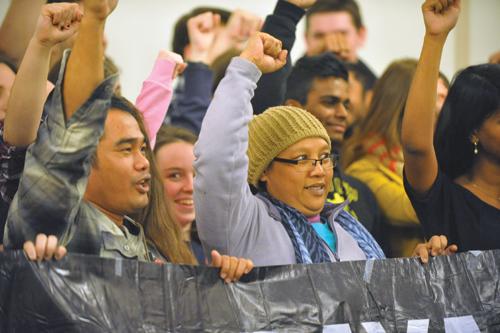Adidas factory workers share sweatshop experiences

February 21, 2013
Heni Sutisna, a PT Kizone factory worker in Tangerang, Indonesia, spoke through an interpreter to tell a hushed crowd how the shoe factory that he’d worked in for years abruptly closed in 2011 after the factory’s owner unexpectedly fled to South Korea, ostensibly to obtain money for the wages he owed the workers.
The owner, however, never came back with compensation for the workers, who were all left without a job. Sutisna’s friend Usri, who expected to continue receiving wages, accrued massive debt while the factory was still open and despaired when she found herself unable to pay it off.
“[Usri] wound up killing her own child before throwing herself in front of a car,” Sutisna said.
Sutisna, who worked at PT Kizone for 13 years, spoke at the Adidas Factory Worker Tour event, hosted Wednesday night by Pitt’s chapter of Americans for Informed Democracy, a student activist group. Almost 80 attendees of the talk sat close together on chairs in Dining Room A of the William Pitt Union during the roughly 90-minute event. Aslam Hidayet, who lead a workers’ union at the factory from 2003 onward, also spoke.
Hidayet and Sutisna explained that they now speak at universities to encourage students to demand that their schools join the Worker Rights Consortium, an organization that monitors conditions at factories that manufacture university apparel. They also encourage universities to sever their contracts with Adidas in order to compel the company to pay PT Kizone’s former workers the unpaid severance.
Since early last semester, AID has attempted to persuade Pitt to join into the WRC through its “No Sweat” campaign. According to an article previously published in The Pitt News, the University is a member of the Fair Trade Association, another group that monitors labor conditions in factories overseas. But members of AID say the labor unions and businesses can affiliate with the Fair Trade Association.
During their remarks, Sutisna and Hidayet focused on their experiences following PT Kizone’s closure. Both pointed out that although the factory manufactured Adidas products, the apparel company refuses to pay the $1.8 million in severance pay that they say the factory’s 2,700 former workers deserve under Indonesian law.
Hidayet added that Adidas’ profits totaled $8.2 billion last year.
“How much profit did they make from the sweat of our labors during the tens of years we worked for them?” he said, explaining that the PT Kizone workers’ demands are miniscule in comparison to the company’s overall earnings.
Silvia Raccagni, the sustainability communication manager at Adidas Group’s headquarters in Herzogenaurach, Germany, denied in an email earlier in the week that the company is under any obligation to pay severance wages to PT Kizone’s workers.
Raccagni said that PT Kizone’s owner ceased to do business with Adidas in 2010, six months before he “unethically closed and abandoned” the factory.
“We honored all terms of our agreement with PT Kizone and cannot accept financial liability for the factory owner who broke the law,” she said in an email.
Raccagni also said that Adidas Group adheres to standards along its chain of production and supply that regulate labor rights, workers’ health and safety and environmental regulations. Company policy also dictates that the workers in factories that manufacture Adidas products receive the minimum wage required by law in their home country or the prevailing industry wage.
In order to check conditions, Adidas conducted 1,501 audits on factories that manufacture its products in 2011, she said. External monitoring groups such as the Fair Labor Association, an organization to which Pitt belongs, conducted 640 of the audits in the same year.
Hidayet, however, said that while the factory was still operating, he faced intimidation whenever he demanded workers’ rights from the factory’s management.
Sutisna, 43, explained that when the factory closed, she and her 48-year-old husband could not find work. When her husband did find a new job, it was a physically demanding position at a construction store, where he carried bags of cement and other heavy objects.
Sutisna’s husband stopped going to work when he began coughing up blood, and the family, which includes three children, moved from their house into a single-room dwelling. Unable to afford food, they ate cassava leaves that their landlord allowed them to pick from the surrounding property.
Hidayet explained that he and others from PT Kizone now coordinate with advocates of workers’ rights all over the world in order to raise wages and improve conditions.
Both he and Sutisna repeatedly encouraged students to speak on behalf of workers like those who worked for PT Kizone.
The United Students Against Sweatshops, which organized the lecture tour for Hidayet and Sutisna, did not require a fee to bring the workers. AID, however, paid the $1,000 recommended donation fee with funding from the Student Government Board, according to Viveka Mandava, a junior who majors in religious studies and minors in political science.
Mandava said that she was pleased with the event and the turnout and remained optimistic about the continued No Sweat campaign on campus.
“We do care about where our clothing is coming from,” Mandava said.






